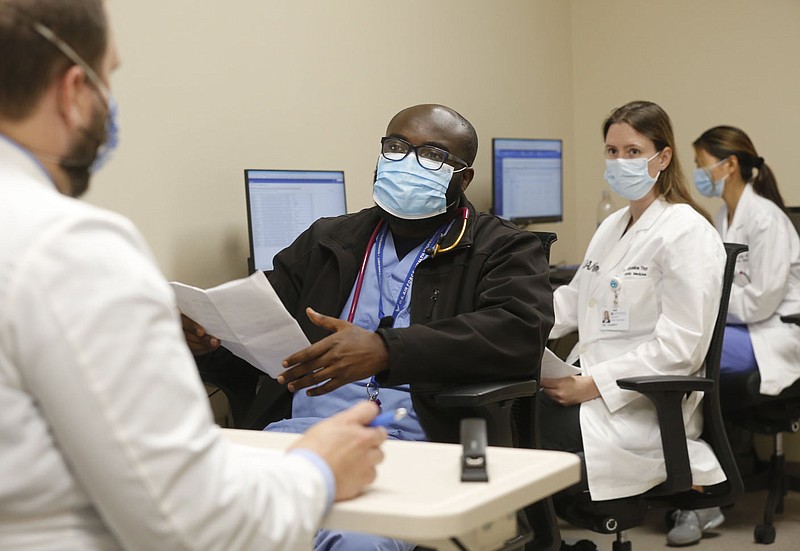FAYETTEVILLE -- Washington Regional Medical Center and the University of Arkansas for Medical Sciences Northwest Regional Campus recently announced a plan to add up to 92 physician residencies and fellowships in Northwest Arkansas by 2030.
The graduate medical education programs will provide more opportunities for physicians in Arkansas, encouraging the best and brightest to continue working in the state, according to Pearl McElfish, vice chancellor of UAMS Northwest.
The additional residencies and fellowships will allow the state to retain more medical school graduates, which will increase the number of physicians available to care for Arkansans. It also will expand access to health care across the state, provide education and jobs to Arkansas medical school graduates, and pour money into the state's economy, said Larry Shackelford, Washington Regional president and CEO.
The Arkansas Legislative Council last month approved nearly $12.5 million to make the expansion plan possible.
Washington Regional already has 28 family medicine residency slots, Shackelford said. The hospital plans to add residency programs in internal medicine, emergency medicine, neurology, family medicine, general surgery and transitional year. A transitional year, similar to an internship, is required for many students before they begin certain specialty programs or if they don't immediately match into the specialty training program of their choice.
Fellowships will be created in cardiology, infectious disease, nephrology, pulmonary and critical care medicine, Shackelford said.
The first 10 residency slots will be available in 2023, according to a joint news release.
Medical students are required to complete residencies or fellowships in their area of specialty to become licensed physicians. Residencies in general areas can take three years while fellowships in specialties such as cardiology or pulmonology can take much longer, McElfish said.
A health care study commissioned by the Northwest Arkansas Council in 2019 recommended 200 more residencies, the news release states.
The council study projected that the new residency training programs will have an estimated economic impact of $715,000 per medical resident on an annual basis; at full capacity of 92 new residents, that's a projected annual economic impact of $65.8 million.
"Expanding graduate medical education in Arkansas will increase the number of available physicians, expand access to health care, and provide education and jobs to graduates, all while stimulating the economy by keeping health care spending in the state," said Nelson Peacock, Northwest Arkansas Council president and chief executive.
DEMAND FOR DOCTORS
Arkansas ranks 47th in active physicians per 100,000 people and 39th in active primary care physicians per 100,000 people, according to the Association of American Medical Colleges 2019 state physician workforce data report.
Not only is the state underserved, but more physicians are retiring from practice than completing training, Shackelford said.
Arkansas produces about 200 more medical students each year than there are residency positions available in-state, so students leave Arkansas for residencies or fellowships in other states, and many never return, Shackelford said. After completing their residency training, 81% of physicians in the nation choose to stay in the same area to practice medicine, he said.
UAMS Northwest Campus graduates around 40 medical students a year, and UAMS as a whole graduated 177 students this year, McElfish said.
Arkansas Colleges of Health Education in Fort Smith graduated an additional 143 osteopathic medical students this year, according to Susan Devero, communications and marketing director.
New York Institute of Technology College of Osteopathic Medicine on the Jonesboro campus of Arkansas State University graduated 117 medical students this year, said Dr. Shane Speights, college dean.
Only 23 of those 117 graduates were able to find residencies in Arkansas, he said.
Any new residency programs in the state are positive, Speights said, "because it's an opportunity for those graduates to stay in the state to continue training, which increases the likelihood they will stay to practice medicine."
STATEWIDE BENEFIT
The $12.5 million approved by the Legislative Council last month is one-time money that will come from the state's restricted reserve fund, which requires approval from three-fifths of the Legislative Council and a letter from the governor, according to state Sen. Jonathan Dismang, R-Beebe, who serves as joint budget chairman and chairman of the Legislative Council's Peer Committee.
Every corner of the state is experiencing physician shortages, and the additional medical education slots will help Arkansas meet health care needs, he said.
"It makes sense," Dismang said. "It's supported by my local hospitals and really is a great step forward for us."
While the residencies and fellowships will be in Northwest Arkansas, many hospitals across the state will benefit because the vast majority of physicians choose to practice medicine in the area they received their residency training, McElfish said.
Medical students from Arkansas and other states will be considered for the residencies and fellowships, she said.
"Our goal is to recruit the best and the brightest from across the nation and the students who plan to stay and practice in Arkansas," McElfish said.
About $2.8 million of the $12.5 million will go to UAMS for residency startup costs, recruitment of faculty in advance of residents beginning their training, program certification and resident recruitment, Shackelford said. The remaining amount will go to Washington Regional for capital costs related to education space, conference and clinical space, and to offset the reimbursement decrease that the hospital will incur because of geographic wage reclassification, he said.
The federal government about 25 years ago capped the number of resident slots that Medicare could subsidize, Shackelford said. Washington Regional was capped at 15 reimbursable positions, a little more than half of the 28 positions it currently has.
The state's investment means Washington Regional can increase residency and fellowship positions through a process of geographic wage reclassification -- changing the hospital's classification from urban to rural, which will reduce the hospital's wage reimbursement from Medicare but allow the residency program a new period to increase the number of residencies, establish a new cap and qualify for additional federal reimbursements, Shackelford said.




